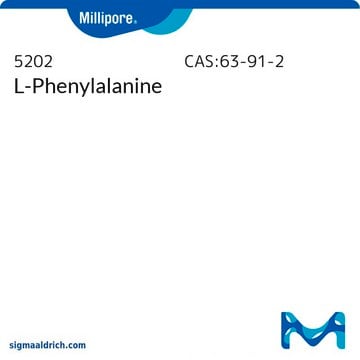P1150000
Phenylalanine
European Pharmacopoeia (EP) Reference Standard
Synonim(y):
L-Phenylalanine, (S)-2-Amino-3-phenylpropionic acid
About This Item
Polecane produkty
klasa czystości
pharmaceutical primary standard
rodzina API
phenylalanine
producent / nazwa handlowa
EDQM
mp
270-275 °C (dec.) (lit.)
Zastosowanie
pharmaceutical (small molecule)
format
neat
temp. przechowywania
2-8°C
ciąg SMILES
N[C@@H](Cc1ccccc1)C(O)=O
InChI
1S/C9H11NO2/c10-8(9(11)12)6-7-4-2-1-3-5-7/h1-5,8H,6,10H2,(H,11,12)/t8-/m0/s1
Klucz InChI
COLNVLDHVKWLRT-QMMMGPOBSA-N
Szukasz podobnych produktów? Odwiedź Przewodnik dotyczący porównywania produktów
Opis ogólny
Zastosowanie
Opakowanie
Inne uwagi
produkt powiązany
Kod klasy składowania
11 - Combustible Solids
Klasa zagrożenia wodnego (WGK)
WGK 1
Temperatura zapłonu (°F)
Not applicable
Temperatura zapłonu (°C)
Not applicable
Wybierz jedną z najnowszych wersji:
Certyfikaty analizy (CoA)
Przepraszamy, ale COA dla tego produktu nie jest aktualnie dostępny online.
Proszę o kontakt, jeśli potrzebna jest pomoc Obsługa Klienta
Masz już ten produkt?
Dokumenty związane z niedawno zakupionymi produktami zostały zamieszczone w Bibliotece dokumentów.
Klienci oglądali również te produkty
Nasz zespół naukowców ma doświadczenie we wszystkich obszarach badań, w tym w naukach przyrodniczych, materiałoznawstwie, syntezie chemicznej, chromatografii, analityce i wielu innych dziedzinach.
Skontaktuj się z zespołem ds. pomocy technicznej








